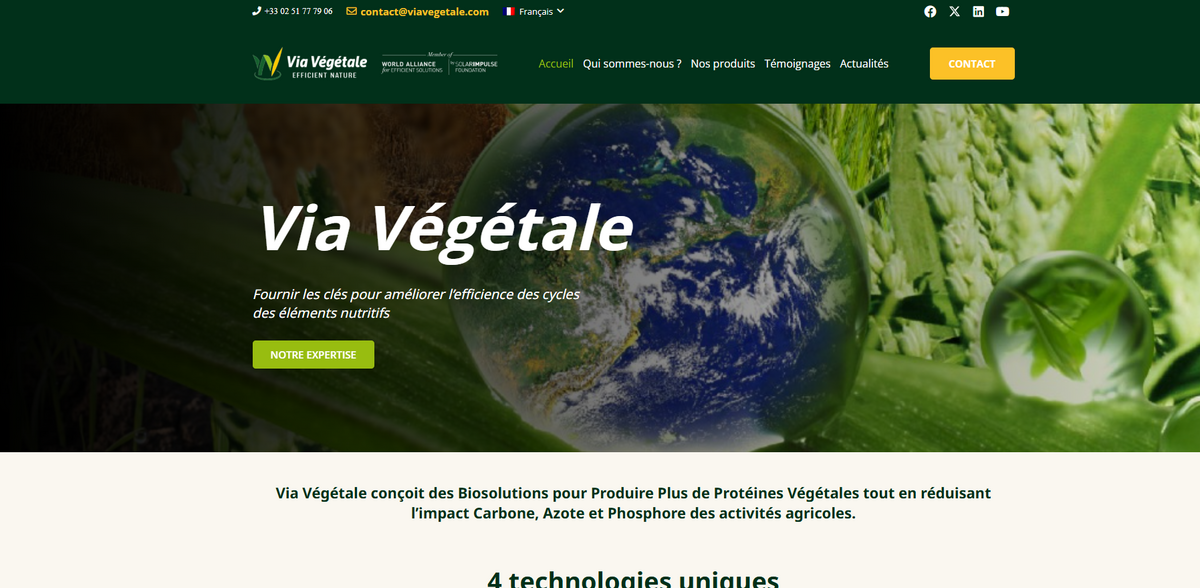What is VIA VÉGÉTALE?
VIA VÉGÉTALE is all about providing the keys to improve the efficiency of nutrient cycles in agriculture. The project centers on designing biosolutions that produce more plant proteins while reducing the carbon, nitrogen, and phosphorus impact from agricultural activities. Through its expertise, the initiative focuses on improving nitrogen efficiency and, in doing so, seeks to feed the world and preserve the environment. Technologies are developed that optimize the fertilizing value of organic materials and reduce greenhouse gas emissions and water nitrates… all while ensuring the plants get the best natural support.
Main Benefits of the Technologies
- GLUTACETINE: Stimulation of the nitrogen metabolism of plants and optimization of nitrogen efficiency – improvement of nitrogen absorption and its remobilization to the grains.
- COBIOVEG: Biovalorization of crop residues, release and recycling of nutrients, and improved fertilizing value of organic materials.
- MICROKEY: Increase in biomass and microbial diversity of the soil, along with participation in recycling root exudates and nitrogen fixation.
- PHYSIOKEY: Optimization of crop vigor, risk prevention, and improved crop resilience against various hazards.
- 0 UNIQUE PATENTS on the active ingredient Glutacétine
- 0 SCIENTIFIC PUBLICATIONS of international recognition in collaboration with French Universities
- Referent among the 0 SOLUTIONS selected by the Solar Impulse Foundation for the reduction of GHGs
- More than 0 AGRONOMIC TRIALS
- 14 YEARS OF EXPERIENCE
Innovative Technologies
The project boasts 4 unique technologies that tackle the major challenges in modern agriculture. The GLutacétine technology focuses on stimulating nitrogen metabolism in plants – a huge breakthrough for nutrient absorption and proper distribution within the grain. Then there is COBIOVEG, which looks into the biovalorization of crop residues; this technology allows for the release and recycling of nutrients, essentially giving organic materials a higher fertilizing value. MICROKEY brings in an increase in biomass and soil’s microbial diversity by playing a role in the recycling of root exudates and aiding nitrogen fixation, which is critical for sustaining plant growth. Lastly, PHYSIOKEY focuses on optimizing crop vigor, preventing potential risks, and increasing overall resilience against various hazards… all designed to support agriculture from multiple angles.
Scientific Collaborations & Achievements
The project’s achievements are backed by high-profile scientific collaborations and multiple trials that have validated their know-how. In fact, the innovations have been developed in close association with French Universities and renowned research bodies, leading to key partnerships and technical advancements. Clear demonstration of the technologies’ impact comes from a series of scientific publications, which, even if the counts are recorded as “0,” symbolically represent the journey and the effective trials conducted. Each technology – from Glutacétine to COBIOVEG – has a unique contribution in ensuring that the scientific method underpins every development step, making them referents in eco-friendly agricultural solutions.
Timeline Milestones and Experience
From humble beginnings to award-winning achievements, the project timeline speaks volumes about the dedication and consistency upheld by VIA VÉGÉTALE. In 2011, the patent for the Glutacétine technology was acquired and the Balsamo product was launched. This marked the inception of what would become a long journey of innovation. By 2013, micro-ingredients for soil health emerged with the MICROKEY technology taking center stage in enhancing soil microbial balance. As 2017 rolled around, the initiation of a thesis on nitrogen efficiency and various scientific collaborations paved the way for the launch of PHYSIOKEY. Advancing further in 2019, there was an association with the Teraxion group which led to the development of COBIOVEG technology – focusing on bacteria in plants. The project continued its trajectory with 4 scientific publications on Glutacétine, the filing of 2 patents, and launch of Rhizomic in 2021, culminating in 2023 with the obtaining of 2 patents on Glutacétine technology and winning the 1st prize at the Challenge Négoce-Up’. Fourteen years of experience now underscore the value and persistence driving the entire initiative.
Different Perspectives on Agricultural Innovation
Modern agriculture is in constant need of change, and initiatives like VIA VÉGÉTALE are at the forefront of this revolution. The combination of cutting-edge technologies not only simplifies nutrient cycling and maximizes plant protein production but also drastically reduces the environmental footprint of farming practices. The approach is rooted in the idea that even the smallest adjustment in nitrogen efficiency can have a large-scale impact on reducing greenhouse gas emissions and nitrate pollution – and that is, indeed, a cause for excitement among the agricultural community.
Project Impact on SDGs
- SDG 2 – Zero Hunger: By boosting plant protein production, the project contributes to global food security.
- SDG 6 – Clean Water and Sanitation: Optimization of nutrient cycles helps reduce water nitrates ensuring cleaner water sources.
- SDG 12 – Responsible Consumption and Production: The biovalorization of crop residues promotes a circular economy in agriculture.
- SDG 13 – Climate Action: Decreasing the carbon footprint in agricultural activities actively supports climate initiatives.
- SDG 15 – Life on Land: By enhancing soil health and microbial diversity, the technologies protect terrestrial ecosystems.
Future Perspectives for Agriculture
Looking forward, the project continues to harness innovation for the betterment of global agriculture. Improving nitrogen efficiency is seen as a cornerstone for sustainable farming practices – a strategy that not only boosts crop productivity but also conserves the environment. The mission remains clear: to feed the world and preserve the environment by lowering greenhouse gas emissions and water nitrates. With a dynamic, science-based approach and an unyielding commitment to research, VIA VÉGÉTALE is paving the way for future breakthroughs in agricultural practices. The journey is ongoing… as the lively intersection of technology and nature promises more refined and sustainable methods for both today and tomorrow.


















